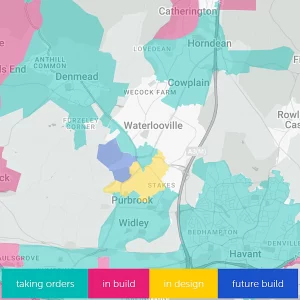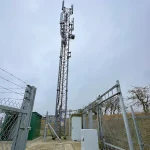Sponsored Links
New BT Innovations Help Slash the Cost of Deploying UK Superfast Broadband
Posted: 08th Nov, 2011 By: MarkJ
 The national telecoms operator, BT Group, recently announced its intention (here) to speed up their £2.5bn rollout of superfast broadband ( FTTC , FTTP ) ISP services by a full year (reaching 66% of the UK by the end of 2014 instead of 2015), which also revealed that the operator would hire an extra 520 telecoms engineers to get the job done sooner.
The national telecoms operator, BT Group, recently announced its intention (here) to speed up their £2.5bn rollout of superfast broadband ( FTTC , FTTP ) ISP services by a full year (reaching 66% of the UK by the end of 2014 instead of 2015), which also revealed that the operator would hire an extra 520 telecoms engineers to get the job done sooner. BT has now revealed a series of additional innovations that are also helping to cut the cost and time of deploying superfast internet services.
BT Superfast Broadband Deployment InnovationsThe measures were quietly outlined in last week's quarterly financial report, which we covered here. Further visual illustrations of the changes can also be found in BT's Q2-2011 Slides (PDF) document.
* Soft dig process. A new spade that can cut through tarmac eliminating the need for a separate “civils “team.
* Micro-trenching. Faster deployment in environmentally sensitive areas.
* Mini DSLAM. Provides cost effective coverage for low density areas and multi-tenant dwelling units (ie blocks of flats).
* Conductive concrete. A cost effective option for meeting electrical safety needs and which lowers civils costs.
* Polymer based plinth. Allows faster, lower cost all-weather deployment and which is environmentally friendly.
* Power supply infrastructure. Removes the need for a meter installation visit and reduces deployment time by two weeks.
Trefor Davies (blog), CTO of Business ISP Timico UK, explained:
"Well actually whilst each of these innovations may seem trivial what they collectively do is send out a signal that BT is trying to do something about the aspect of it’s business that is often criticised as being one of the barriers to cost effective fibre (FTTC & FTTP) rollout and that is the cost of digging trenches.
When the Caio Report came out in 2009 it quoted a figure of £29Bn as the cost of rolling out fibre to every home in the UK. Of this something like £24Bn was supposedly the civil engineering cost.
Looking at it simplistically you can see that halving the cost of the civil engineering effort has a massive effect on the total cost of the network roll out with, presumably, a knock-on positive effect on the business case."
"Well actually whilst each of these innovations may seem trivial what they collectively do is send out a signal that BT is trying to do something about the aspect of it’s business that is often criticised as being one of the barriers to cost effective fibre (FTTC & FTTP) rollout and that is the cost of digging trenches.
When the Caio Report came out in 2009 it quoted a figure of £29Bn as the cost of rolling out fibre to every home in the UK. Of this something like £24Bn was supposedly the civil engineering cost.
Looking at it simplistically you can see that halving the cost of the civil engineering effort has a massive effect on the total cost of the network roll out with, presumably, a knock-on positive effect on the business case."
It should be pointed out that Timico doesn't know how the announcements will actually affect the overall costs for BT, although taken together they do appear to show a lot of promise. However BT's move to bring its rollout forward by a year suggests that at least some of the savings have already gone towards improving their deployment schedule.
Search ISP News
Search ISP Listings
Search ISP Reviews
Latest UK ISP News








Cheap BIG ISPs for 100Mbps+
150,000+ Customers | View More ISPs
Cheapest ISPs for 100Mbps+
Modest Availability | View More ISPs
Latest UK ISP News
Helpful ISP Guides and Tips
Sponsored Links
The Top 15 Category Tags
- FTTP (6798)
- BT (3881)
- Politics (3074)
- Business (2766)
- Openreach (2663)
- Building Digital UK (2512)
- Mobile Broadband (2475)
- FTTC (2142)
- Statistics (2127)
- 4G (2092)
- Virgin Media (2024)
- Ofcom Regulation (1779)
- 5G (1732)
- Fibre Optic (1604)
- Wireless Internet (1595)
Sponsored
Copyright © 1999 to Present - ISPreview.co.uk - All Rights Reserved - Terms , Privacy and Cookie Policy , Links , Website Rules































